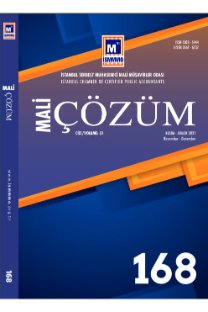MUHASEBE TAHMİNLERİNİN DENETİMİ: STOKLAR VE TİCARİ ALACAKLAR İÇİN BİR UYGULAMA
Uluslararası muhasebe standartlarının öngördüğü çeşitli değerleme ilkelerine göre işletme yönetimleri tarafından yapılan muhasebe tahminleri, işletmelerin gelir ve giderlerini önemli ölçüde etkilemekte ve bu durum finansal tablolar üzerinde de etkili olmaktadır. İşletme yönetimin yaptığı tahminler gerçeğe uygun değer (fair value) ilkesine uygun yapılmalıdır. İşletme yönetiminin muhasebe tahminlerini doğru şekilde yapması finansal tabloların gerçeği yansıtması açısından önemlidir.İşletme yönetiminin yapmış olduğu tahminler genel olarak belirsizlikler içerir ve geniş bir yelpazeye yayılabilir ve çeşitli sübjektiflik gösterebilir. Muhasebe tahminlerinin doğrudan şirketin kâr ve zararını etkilemesi nedeniyle finansal tabloların bağımsız denetiminde önemle incelenmesi gereken muhasebe uygulamalarıdır. Uluslararası muhasebe standartları içinde stok, alacak ve amortismanlara yönelik standartlar oldukça kapsamlı şekilde sunulmuştur. Muhasebe tahminlerinin yapılması sırasında işletme yönetimi tarafından yapılacak kasıtlı veya kasıtsız hataların mali tablo kullanıcıları veya karar alıcılar açısından etkisi ihmal edilemez düzeyde olabilir. Bu nedenle bağımsız denetim sürecinde de, işletme yönetiminin tahminlerin nasıl oluştuğunu detaylı bir şekilde ortaya koyması gerekir. Yapılan muhasebe tahminlerinin, benzer işletme ve sektördeki uygulamalarla karşılaştırılabilir olması önem taşır.Muhasebe tahminlerinin barındırabileceği önemli yanlışlık riskleri nedeniyle, bağımsız denetim sürecinde denetçinin, gerekli denetim prosedürlerini uygulayarak muhasebe tahminlerinin mâkul olup olmadığına ilişkin bir sonuca varması gerekir
AUDITING ACCOUNTING ESTIMATES: AN APPLICATION FOR THE INVENTORIES AND TRADE RECEIVABLES
According to the various evaluation principles, accounting estimates that are done by business managements, affect the incomes and expenses significantly and this situation is also effective on financial statements. Those estimations also are to be biased to the fair value principle. It's crucial for the estimations to be accurate so that financial statements could reflect the actual values. The estimations performed by a business management generally consist of uncertainty and they can vary considerably as well as being subjective. As the accounting estimations have direct effects upon the profit and loss of a company, they are accounting applications that must be audited with utmost care during independent audits of the financial statements. Within the international accounting standards, the standards regarding inventories, trade receivables and depreciation are covered comprehensively. The effects of the intentional or unintentional mistakes made by the management during the process of performing accounting estimates might prove to be impossible to ignore for the users of the financial statements or the decision makers. Thus it is vital that during the independent auditing process it is set forth in detail how the accounting estimations of the management have been created. It is important for accounting estimations to be able to compared with the structures of similar businesses and sectors. Due to the potential inaccuracies that accounting estimates might involve, during the independent audit process the auditor needs to reach to a conclusion as to whether the accounting estimations are reasonable or not by applying the audit procedures.The goal of this study is to set forth the auditory procedures for accounting estimations within the scope of ISA-540 and transactions to be carried out against the risks of inaccuracy of significance arising from the application of such procedures with additional financial correction procedures to be applied for the significant risks and to evaluate with examples by application
___
- Bahadır, Oğuzhan, (2012), "Stoklarda Değerleme: UFRS/TFRS ve Vergi Mevzuatı Açısından", Mali Çözüm 109, (2012): 63
- BDS 220 : Finansal Tabloların Bağımsız Denetiminde Kalite Kontrol Standardı, (2013). Ankara : KGK
- BDS 300 : Finansal Tabloların Denetiminin Planlanması Standardı, (2013). Ankara : KGK
- BDS 330 : Bağımsız Denetçinin Değerlendirilmiş Risklere Karşı Yapa- cağı İşler Standardı (2013). Ankara : KGK
- BDS 540 : Gerçeğe Uygun Değere İlişkin Olanlar Dâhil Muhasebe Tahminlerinin ve İlgili Açıklamalarının Bağımsız Denetimi Standardı (2014). Ankara : KGK
- Bozkurt, Nejat (2012), Muhasebe Denetimi. İstanbul : Alfa Yayınları.
- CAS 540 : Canadian Auditing Standard
- Demir, Şeref (2012) Türkiye Muhasebe ve Finansal Raporlama Stan- dartları. Ankara: Seçkin Yayıncılık
- Finansal Raporlamaya İlişkin Kavramsal Çerçeve
- Güredin, Ersin, (2000), Denetim. İstanbul: Beta Yayınları.
- Kavut, Lerzan., Taş, Oktay ve Şavlı, Tuba, (2009), Türkiye Muhasebe Standartları Kapsamında Bağımsız Denetim. İstanbul : İSMMMO.
- Kieso, Donald E.,Weygandt, Jerry J., Warfield, Terry D., (2011), "Inter- mediate Accounting", 15.ed. USA: Wiley.
- Poroy Arsoy, A.,(2009), Uluslararası Muhasebe ve Finansal Raporlama standartlarına Göre Gerçeğe Uygun Değer. Bursa: Dora Yayınları
- Smieliauskas, W., "Principles-Based Reasoning about Accounting Es- timates", Accounting Perspectives, (2012), The Canadian Accounting Asso- ciation
- Toroslu, M. Vefa, (2011), Türkiye Muhasebe Standartlarında Hası- lat-Maliyet İlişkisi. Ankara: Adalet Yayınevi
- Türker, İpek,(2006), "Muhasebe Tahminlerinin Denetimi", Muhasebe Denetime Bakış, Temmuz-2006, (2006):140
- TMS 2 : Türkiye Muhasebe Standardı, Stoklar, (2005).
- TMS 18 : Türkiye Muhasebe Standardı, Hasılat, (2005)
- Yükçü Süleyman, Gönen Seçkin, (2012), "Muhasebe Politikaları, Muha- sebe Tahminlerindeki Değişiklikler ve Hatalar Standardına İlişkin Uygulama Örnekleri", Mali Çözüm.114, (2012):27
- ISSN: 1303-5444
- Yayın Aralığı: Yılda 6 Sayı
- Başlangıç: 1991
- Yayıncı: İstanbul Serbest Muhasebeci Mali Müşavirler Odası
Sayıdaki Diğer Makaleler
MÜŞTERİ YAŞAM SEYRİ MALİYETLEMENİN KAVRAMSAL ÇERÇEVESİ VE BİR VAKA ÇALIŞMASI
DENETİM STANDARTLARINA GÖRE SINIRLI BAĞIMSIZ DENETİM (FİNANSAL TABLOLARIN GÖZDEN GEÇİRİLMESİ)
MUHASEBE TAHMİNLERİNİN DENETİMİ: STOKLAR VE TİCARİ ALACAKLAR İÇİN BİR UYGULAMA
